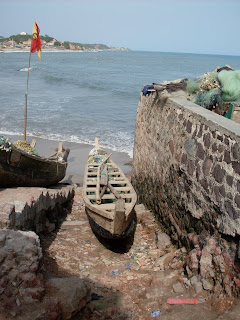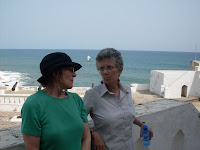Thursday morning we headed west to the Cape Coast Castle, a World Heritage site, and one of the primary slave embarkation points from West Africa. It was wonderful and awful, powerful and shocking. We all “know” about slavery – the capturing, the overland treks, the pre-sailing imprisonment, the crossing, and then the life once they got to the other side.
But we didn’t know. We didn’t know about 200 male captives living – those that didn’t die – for up to 3 months in an underground chamber about 40x60 with almost no light or ventilation, and absolutely no “facilities.” Literally, the waste simply piled up to a depth of roughly 3 feet (the marks were still visible on the walls) until the men were led out the “Door of No Return” to the canoes that would take them to the ships.
 So our first horrible impression on seeing the small room – “There’s no space for people to lie down” – was replaced by the even more horrible realization that no one would even dream of laying down.
So our first horrible impression on seeing the small room – “There’s no space for people to lie down” – was replaced by the even more horrible realization that no one would even dream of laying down.And one other thing we didn’t know: immediately above this underground hell, the British had erected their Anglican Chapel and as they sang praises to their God, they were forced to suffer the unspeakable indignity of the offensive cries and smells coming from below them.

Of course, there were other parts of our Cape Coast stay as well. The coast itself was rocky and dramatic, the way the fishing canoes raise small sails was ingenious, and things like the great sign for a woodworker, the lovely mural we found on a small house near a shrine, as well as the shrine itself restored our spirits a bit.




On the way from Cape Coast to Kumasi in the center of the country, we made a stop at Kakum National Park and walked the canopy walk, a linked series of 7 tree-to-tree rope walkways,
 suspended about 200 feet above the forest floor. Let’s just say we put one foot in front of the other – right in the middle of the narrow walkway – and made it, though we didn’t intentionally bounce the walkway like the adolescents in front of us. Then again, we didn’t squeal like the school girls behind us.
suspended about 200 feet above the forest floor. Let’s just say we put one foot in front of the other – right in the middle of the narrow walkway – and made it, though we didn’t intentionally bounce the walkway like the adolescents in front of us. Then again, we didn’t squeal like the school girls behind us.On to Kumasi, the number two city in Ghana, which we really liked. It was greener and tree-ier than Accra. It had the feel of a city that hangs together (unlike Accra, which sprawls). And it had sidewalks, which we’d never realized can make such a difference.
A friend in Warwick had asked us to deliver an envelope to Frank, a doctor who’d been supported through secondary school, university, and medical school by the friend’s husband ever since the time he’d been a Peace Corps volunteer and met Frank. [There’s much more to this wonderful story, but it’s too much to tell here.]
How lucky we were to have met Frank and his wife Tina.
Tina took us to the market Saturday morning. This may not sound like a big deal, but it was a VERY BIG DEAL. This market is reputed to be the biggest in Africa.
 It’s impossible to describe the enormity of the space it occupies, every square inch filled with someone selling something.
It’s impossible to describe the enormity of the space it occupies, every square inch filled with someone selling something.We walked and walked and walked, attracting a bit of attention, following along behind Tina as if we were her ducklings. (We felt like a rock group, Tina and the Four Obrunis.) The vendors were overwhelmingly friendly and open and curious. We thought we’d seen markets but… And we never could have done it without Tina.
Then, Tina handed us off to Frank, who had just finished his morning shift at his maternity clinic. He took us to a wood-carving village,
 an adinkra-cloth village, and a kente-cloth-weaving village. Then he went for his second shift, this one at the hospital.
an adinkra-cloth village, and a kente-cloth-weaving village. Then he went for his second shift, this one at the hospital.The next day we headed home, but stopped along the way at the village of Nkwatia (en-kwat-EE-a), way up on a cliff-top, where the air was deliciously cooler.
 We visited the school where Dick, back in 1961, had been part of the Crossroads Africa group that had started the construction of the first building, the one in the picture. And that school has sprouted into a beautiful and huge (and still growing) campus, reputed to be one of the best schools in Ghana. A thrill and a half for Dick, a nice experience for us too.
We visited the school where Dick, back in 1961, had been part of the Crossroads Africa group that had started the construction of the first building, the one in the picture. And that school has sprouted into a beautiful and huge (and still growing) campus, reputed to be one of the best schools in Ghana. A thrill and a half for Dick, a nice experience for us too.Back to Accra and a quick trip to La beach. A great ending to a great trip.




















